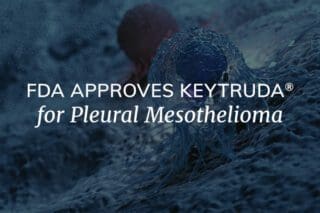
In the past, a collaboration between the United States and Cuba seemed unlikely. But with former President Barack Obama restoring diplomatic relations with the island nation last year, an important new clinical trial will soon be under way.
Cuba’s Center of Molecular Immunology (CIM) has been working on a lung cancer vaccine, known as CIMAvax, for the past 25 years. It has been available to patients in Cuba since 2011, and it has already been used to treat over 4,000 lung cancer patients worldwide.
Last October, Roswell Park Cancer Institute received approval from the U.S. Food & Drug Administration for their clinical trial of the vaccine. The clinical trial just opened for enrollment and will include 60 to 90 patients who have advanced non-small cell lung cancer. Since lung cancer is the leading cause of cancer death in the U.S., this research could prove invaluable.
How CIMAvax Works
CIMAvax is a type of immunotherapy, meaning it enhances the body’s immune system to fight cancer. In particular, CIMAvax works by targeting the epidermal growth factor (EGF), a type of protein the cancer cells need to grow.
While the vaccine doesn’t kill these cells directly, it blocks the EGF’s receptor, known as EGFR, to “starve” the cancer cells. Without this protein, the cancer cells can’t grow and spread, and eventually they will die. This whole process works by a carrier agent that triggers the immune system to produce antibodies and help block EGF from the cancerous cells.
Unlike many vaccines, CIMAvax is described as therapeutic, not preventive. Its purpose is to ideally reverse or at least halt the lung damage in these patients, and help prevent recurrence or secondary tumors.
Researchers at Roswell Park Cancer Institute have said the vaccine may also prove to be an effective treatment for other cancers, like colon cancer, prostate cancer, and breast cancer. They’re hopeful it could eventually also be effective at preventing cancer altogether.
The clinical trial is available to patients with late-stage, non-small cell lung cancer (NSCLC). Researchers are looking to include patients who have seen progression in the disease during or following their first-line treatment of chemotherapy.
The CIMAvax will be administered via a monthly shot, and patients in the trial will also receive a dose of Opdivo® (nivolumab), an immunotherapy drug that was approved by the FDA in 2015 to treat NSCLC. Opdivo is a checkpoint prohibitor, which blocks proteins on the cancer cell that turn off the body’s responsive T cells that would otherwise kill them. Researchers want to see if the combined therapies will be more effective together.
Roswell Park Cancer Institute may also receive another vaccine for clinical trial study from CIM. Vaxira® (racotumomab) is another therapeutic vaccine that targets solid cancer tumors and prevents tumor growth similarly to CIMAvax. This vaccine was also developed with the treatment of non-small lung cancer in mind, but early testing has shown promise for other cancers as well.
The Importance of Clinical Trials
Though it’s not clear if CIMAvax will be able to benefit mesothelioma patients, since most don’t see mutations in the EGF protein the vaccine targets, it highlights the important work of clinical trials. These emerging therapies have shown promise in treating a variety of cancers, including rare ones like mesothelioma.
Clinical trials can form the foundation for creating a more effective treatment for cancer patients. Though there are, of course, never any guarantees for positive results, these studies help improve and advance the standard of medical care. They can also improve diagnostic techniques and prevention. Patients considering participating in a clinical trial should discuss with their doctor and see if it’s the best option for their case.
Research efforts are also ramping up with the Cancer Moonshot that has the goal of ending cancer for good. Though we aren’t quite there yet, these combined research efforts coupled with new technologies make the future look bright.




